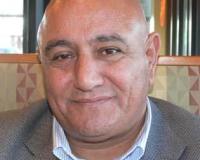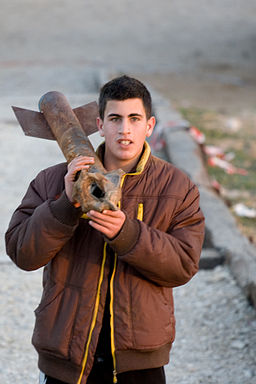Plea by former mayor to help town hit by 8,000 Hamas missiles
by - 29th July 2014
 Israel’s defences are impressive but for many living near the borders, the bombardment is still intense.
Israel’s defences are impressive but for many living near the borders, the bombardment is still intense.
David Bouskila, former Mayor of Sderot in the Negev Desert was speaking at the Board of Deputies of British Jews in London at an event organised with the Jewish National Fund in an attempt to win sympathy for the plight of his besieged town.
The money spent on protecting citizens has paid off and the death rate in this part of Israel itself is low compared to the sufferings the world has witnessed on the other side.
But the psychological toll remains immense for those under constant attack, especially children who are now reaching bar mitzvah age without ever having known what it is like not to be under rocket attack.
Heartfelt
One heartfelt question which underlay this whole meeting was: ‘What would it take for the world to understand exactly what it is like to live a life under this bombardment?’
It cannot be to drop her defences, or the defensive attack, to allow more of her own children to die, and garner sympathy that way. The knowledge that the goal of Hamas is to wipe this nation of the map cannot be denied, and this is what the residents of Sderot face every day of their lives.
Bouskila’s plea was for help and understanding for this at a time when so much of international attention is on the human sufferings over the border.
Bouskila described how his parents took a boat from Morocco in 1956, heading for Jerusalem, but woke up one morning surrounded by a few tents in the sand of what was the emergent Sderot. Mass immigration from Russia in 1989 increased residents from 9,000 to 20,000. Then on 15 April, 2001 the first missile hit the town.
 ‘We did not understand. It was the first. Maybe there will be another one or two. It will finish. Since then, more than 8,000 missiles have hit the town in 13 years.’
‘We did not understand. It was the first. Maybe there will be another one or two. It will finish. Since then, more than 8,000 missiles have hit the town in 13 years.’
The figures are a problem at a time of international outcry against Israel because of the vivid images of dead and injured children hitting social media screens in the West.
Although just one is too many, just five children have died in Sderot in 13 years under this constant attack, hit in the roads, playgrounds, an entrance to a kindergarten. That the figures are so low is a tribute to the town’s defences but at the present time, not an easy point to argue from.
Bouskila's response is to argue that each one of those 8,000 missiles represented the potential death of a child. The other side could also build shelters, not tunnels, he argues.
In the present climate it does seem almost impossible to get across the argument that if Israel announced an immediate and total ceasefire, the rockets would not stop coming. The goal of Hamas would remain the extinction of Israel.
The latest figures bear testimony to a shocking rise in anti-Semitism resurfacing on the streets of France and Britain that is forcing observers to ponder what was until recently thought unimaginable - that ‘it’ could, possibly, happen again.
Nevertheless, it must remain possible to ask difficult questions, to talk about death in Gaza, without being condemned as anti-Semitic.
‘You go to sleep and do not know whether you will wake up,’ says Bouskila. ‘After hearing the siren you have 15 seconds. For everyone, this is nothing. But for the people in Sderot, it can be the difference between life and death.’
Bouskila is eloquent in explaining the toll of a life under fire. Between 2006 and 2007 alone, more than 8,000 people left Sderot. In 2008, Bouskila was elected mayor for the third time. ‘The biggest challenge was to get children playing in the playgrounds again. Hundreds of people are suffering post-traumatic stress disorder.
Peaceful
‘The only thing I want is a peaceful atmosphere to grow our children normally,’ he says. ‘Nothing else. I feel pain for my children and at the same time I feel pain for the children the other side of the border.
'It is so intractable. They do not recognise or accept our right to be there. We want nothing else but the right to keep our homes.’
Meanwhile, further within Israel, there are stories of peace. Hundreds of young British Jewish students are in Israel this summer as they are each year, a post-GCSE rite of passage, learning to love the country.
Israel’s complex internal religious life also goes on, quietly and beneath the radar. In just one example, every summer Jewish and Arab Christian leaders from the controversial messianic communities are getting together to run their Arab-Jewish Pastors’ and Families' Retreat.
Israel Pochtar, of the messianic group Israel’s Peace Ministries, says: ‘A few hundred pastors, leaders and ministers and their families from all over Israel come together by the shore of the Sea of Galilee for a few days of fellowship, prayer, worship and sharing.’
Being a messianic pastor in Israel is not an easy task, he admits. ‘Not only is it not exactly prestigious, but it is also unpopular and considered odd to most people in the land.’
